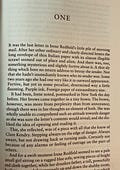In March of 2024, The Atlantic posted their list of “The Great American Novels” of the last century. They then demanded, “You have to read them.” This is my diary of doing just that.
First published in 1929, Passing is a 120-page banger that I had never had the privilege of reading before —had never even heard of before until a couple of years ago when it was adapted into a film starring Tessa Thompson and Ruth Negga and directed by Rebecca Hall.
As I have mentioned many times on this blog I’m sure, I have two degrees in English and, as such, was subject to a lot of “required” reading. Every once in a while, however, I come across a novel like this one: it seems a shame that no one has put it into my hands before.
Passing is the story of two well-off African-American women, Clare and Irene, who grew up together and who are both light-skinned enough to “pass” as White. As a matter of fact, Clare, now an adult, has successfully been passing for years and is married to a racist White man (truly, this man is awful in both his speech and actions—there’s no gray-area intended in his character). While Clare’s choices have brought her a kind of freedom to move through the world, she has, when the novel opens, developed regrets and recruits her old friend, Irene into trying to help her re-integrate somewhat into Black society and, in essence, try to “have it both ways.” As you may imagine, this endeavor of Clare’s ends poorly.
Passing has three parts. Each are brutal. A standout scene is during the second part, in which, Irene first meets Clare’s husband, and he assumes she’s White. I love a scene I’ve come to call “the awkward dinner party,” and this is truly one of the most uncomfortable scenes I’ve read in a while.
Clare is ambitious and bold. Irene is practical and loyal. They are both performing and not performing. It’s all so beautifully complicated.
Since this is such a slender book, everything from diction to dialogue stands out and matters. A word that comes up often is “safe” or “safety.” Irene, the cautious one, is concerned about Clare’s recklessness (the first page describes her as “[s]tepping always on the edge of disaster”) and fears that her temptation to socialize with her old friends and members of Black society will hurt her in some way. So there are all these questions like: Is passing safer? Is lying about oneself safer? Is lying to oneself safer? What does this even mean?
Around when the film version of Passing came out, the New York Times Style Magazine published an article by Brit Bennett about the novel and its impact. Bennett might be most known for her novel, The Vanishing Half, but I think her novel previous to that, The Mothers, is just top-notch phenomenal. Since I can’t say much more/better than she could, I’ll just end by point you in the direction of that article, which also features some great accompanying visuals.
Next up on the list are two novels by William Faulkner. Send help.
Thanks for reading,
xosam



